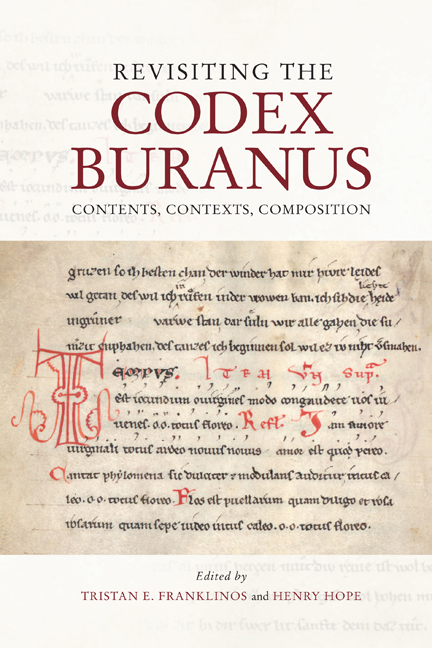Book contents
- Frontmatter
- Contents
- List of Illustrations
- Acknowledgements
- Abbreviations
- Dedication
- Introduction: The Codex Buranus – A Unique Challenge
- Chapter 1 A Modern Reception History of the Codex Buranus in Image and Sound
- Chapter 2 Parody in the Codex Buranus
- Chapter 3 Satire in the Codex Buranus
- Chapter 4 ‘Artes Amatorie Iam Non Instruuntur’: Learned and Erotic Discourse in the Carmina Burana
- Chapter 5 Classical Learning and Audience in the Carmina Amatoria: A Case-Study on CB 92
- Chapter 6 Rape, the Pastourelle, and the Female Voice in CB 185
- Chapter 7 Rethinking the Carmina Burana III: The Poetry of Peasants
- Chapter 8 Predestination and God’s Grace: The Salvific Architecture of the Religious Songs in the Codex Buranus
- Chapter 9 Revisiting the Plays of the Codex Buranus
- Chapter 10 Revisiting the Music of the Codex Buranus
- Chapter 11 Locating the Codex Buranus: Notational Contexts
- Chapter 12 Plurilingualism in the Codex Buranus: An Intercultural Reconsideration
- Chapter 13 Compilation, Contrafacture, Composition: Revisiting the German Texts of the Codex Buranus
- Afterword: multiformis armonia, scolaris symphonia
- List of Manuscripts
- Bibliography
- Index
- General Index
- Studies in Medieval and Renaissance Music
Chapter 4 - ‘Artes Amatorie Iam Non Instruuntur’: Learned and Erotic Discourse in the Carmina Burana
Published online by Cambridge University Press: 16 September 2020
- Frontmatter
- Contents
- List of Illustrations
- Acknowledgements
- Abbreviations
- Dedication
- Introduction: The Codex Buranus – A Unique Challenge
- Chapter 1 A Modern Reception History of the Codex Buranus in Image and Sound
- Chapter 2 Parody in the Codex Buranus
- Chapter 3 Satire in the Codex Buranus
- Chapter 4 ‘Artes Amatorie Iam Non Instruuntur’: Learned and Erotic Discourse in the Carmina Burana
- Chapter 5 Classical Learning and Audience in the Carmina Amatoria: A Case-Study on CB 92
- Chapter 6 Rape, the Pastourelle, and the Female Voice in CB 185
- Chapter 7 Rethinking the Carmina Burana III: The Poetry of Peasants
- Chapter 8 Predestination and God’s Grace: The Salvific Architecture of the Religious Songs in the Codex Buranus
- Chapter 9 Revisiting the Plays of the Codex Buranus
- Chapter 10 Revisiting the Music of the Codex Buranus
- Chapter 11 Locating the Codex Buranus: Notational Contexts
- Chapter 12 Plurilingualism in the Codex Buranus: An Intercultural Reconsideration
- Chapter 13 Compilation, Contrafacture, Composition: Revisiting the German Texts of the Codex Buranus
- Afterword: multiformis armonia, scolaris symphonia
- List of Manuscripts
- Bibliography
- Index
- General Index
- Studies in Medieval and Renaissance Music
Summary
One striking feature of the Codex Buranus is its considerable interest in erotic topics, which is not necessarily limited to concepts of courtly love or the education of young lovers; instead, we also observe a number of troublesome aspects that appear to undermine the ideals of courtly manners and entertainment as well as the values of clerical learning. Given their language (predominantly Latin), their melodies, their abundant references to classical literature and mythology, and the topics and concepts presented in these songs, the Carmina Burana have been identified as the product of a highly sophisticated monastic or scholarly milieu and have provided us with significant insights into the world of twelfthand thirteenth-century learning.
Depending on the text in question, the ideal of love is, at times, glorified and playfully explored; at other times, we hear of deep frustration and the decline of the entire erotic culture because Ovid's amatory teachings are no longer being passed on in an adequate manner, as CB 105 (Dum curata uegetarem) dramatically illustrates. The mythological figure of Cupid appears to a dreamer, but he is in a miserable state, with marred wings and a grieved countenance; he explains the reason for his unseemly appearance: ‘artes amatorie iam non instruuntur | a Nasone tradite, passim peruertuntur’ (‘the arts of love, handed down by Ovid, are no longer taught but everywhere perverted’, §7.1–2). Here, as is the case in the works of other poets, rather pessimistic opinions about the state of learning are voiced. The close study of a major section of the Codex Buranus nevertheless indicates that the experience of the erotic continued to be of central importance to poets and contributed to the development of learned poetry in the vein of their classical predecessors. That was only one aspect, however, and the large corpus of rather dramatic – if not graphic – songs dealing with the erotic, whether influenced by classical models or not, deserves to be considered in depth in order to understand the central significance of the theme of love in all of its manifestations in the High Middle Ages.
- Type
- Chapter
- Information
- Revisiting the Codex BuranusContents, Contexts, Compositions, pp. 97 - 118Publisher: Boydell & BrewerPrint publication year: 2020

